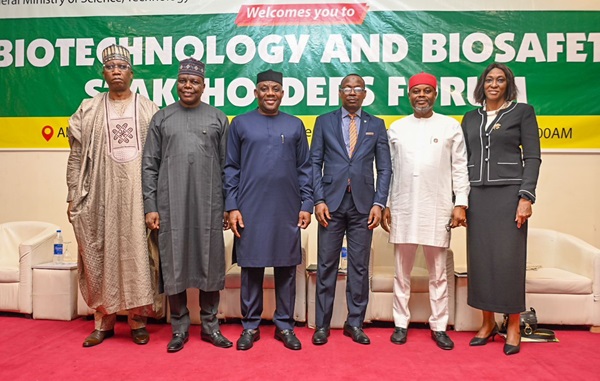
The Federal Government of Nigeria has urged for open, transparent and inclusive discussions on biotechnology, particularly genetically modified organisms (GMOs) in recognition of the potential of biotechnological advancements to revolutionise agriculture and address societal challenges.
This call was made during a ministerial meeting on demystifying genetically modified organisms (GMOs) with civil society organisations in Abuja.
Minister of Science, Technology and Innovation, Chief Uche Nnaji emphasised the historical pattern of resistance followed by acceptance of scientific innovations, drawing parallels to past advancements like cars, vaccines and airplanes. He highlighted the pivotal role of innovation in driving progress and addressing complex challenges, emphasising the potential of GMOs to enhance crop yields, improve nutrition and mitigate climate change impacts on food security.
Minister of State for Environment, Dr. Iziaq Adekunle Salako underscored the revolutionary breakthroughs in environmental science and agriculture facilitated by biotechnology. He emphasised biotechnology’s role in reducing pesticide use, protecting biodiversity and enhancing resilience to climate change while improving nutrition and healthcare outcomes.
Acknowledging public concerns surrounding biotech products, especially in agriculture, Salako reassured Nigerians of the government’s commitment to safety and environmental protection through stringent regulatory measures enforced by the National Biosafety Management Agency.
Director-general of the National Biotechnology Research Development Agency (NBRDA), Prof. Abdullahi Mustapha highlighted the need for informed dialogue to address misconceptions and concerns regarding GMOs. He stressed the importance of collaboration among stakeholders to prioritise public safety, sustainability, and the common good.
Director-general of the National Biosafety Management Agency (NBMA), Dr. Agnes Asagbra reiterated the agency’s dedication to safeguarding human health and biodiversity from potential risks associated with modern biotechnology. She emphasised the agency’s rigorous assessments of GMOs and public awareness campaigns to ensure safe and beneficial biotechnological advancements.
The meeting served as a platform for stakeholders from government, academia, industry, farmer groups, civil society and the public to foster a deeper understanding of GMO-related issues, identify common ground and chart a collective path forward. It aimed to enhance biosafety regulations and promote sustainable biotechnological practices for the prosperity of the nation.
The Nigerian government’s advocacy for inclusive dialogue reflects its commitment to harnessing the benefits of modern biotechnology while ensuring safety, environmental protection, and public welfare. Collaborative efforts and informed decision-making will be key to navigating the complexities of GMOs and advancing sustainable agriculture and development in Nigeria.

